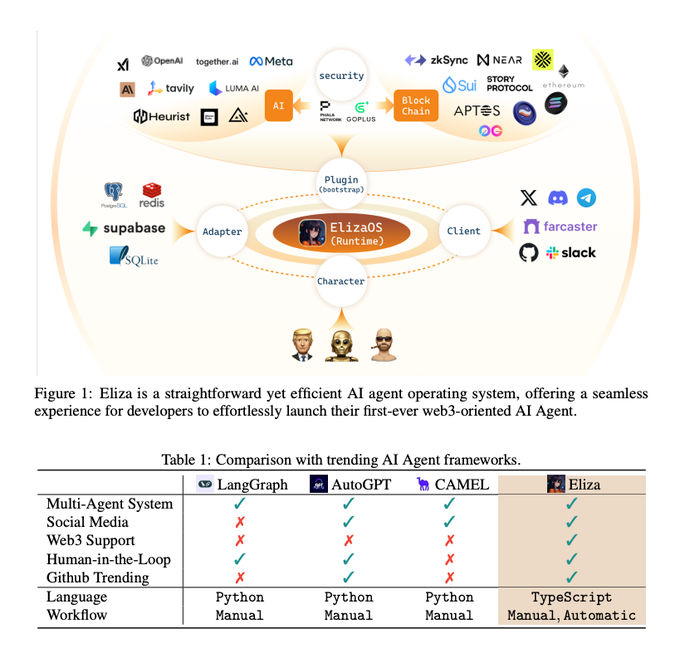Over the past year, the surge in AI and blockchain integration has driven innovation in decentralized technologies, and Eliza’s framework aims to streamline this convergence. On these grounds, Eliza Labs released its technical whitepaper today, detailing its open-source AI agent operating system.
Building the Future of AI Agents
The whitepaper, co-authored by Shaw and contributors from related organizations, introduces Eliza as an open-source operating system for AI agents. Built using TypeScript, the platform enables direct integration with web3 technologies, including blockchain data interaction and smart contract operations.
Eliza’s architecture stands out through its modular design. The system splits into a core Runtime and four key components: an Adapter for data integration, a Character for defining agent personalities, a Client for message interactions, and a Plugin for universal functionalities. This structure allows developers to customize AI agents without touching the core system.
The platform demonstrates impressive versatility in its ecosystem support. It seamlessly connects with major blockchain networks like Solana, Ethereum, and Ton. The system also integrates with leading AI providers, including OpenAI, Llama, and Qwen, while supporting popular platforms like Twitter, Discord, and Telegram.
Performance and Future Roadmap
In recent benchmark tests, Eliza showed promising results. The GAIA benchmark, which evaluates AI agents’ problem-solving capabilities, saw Eliza achieve a 19.42% overall score. For basic tasks, the system reached a notable 32.21% completion rate.
The platform introduces advanced cognitive technologies through various thinking models. These include Chain-of-Thoughts for step-by-step explanations, Tree-of-Thoughts for exploring multiple solutions, and Graph-of-Thoughts for connecting reasoning paths.
Looking ahead, Eliza Labs has identified key areas for improvement. The team plans to enhance workflow automation, runtime efficiency, and multi-language support. Their roadmap includes integrating Hierarchical Task Networks designed to break complex tasks into manageable components.
The timing proves significant, as the AI agent industry experiences substantial growth. Market research indicates the sector, currently valued at $5.29 billion, could grow at a 40% annual rate through 2035. This expansion suggests an increasing demand for platforms bridging AI and blockchain technologies.
According to community-run dashboard data, Eliza currently powers over 30 AI agents. The platform aims to evolve into a fully autonomous AI system capable of independent task planning and execution. This development comes as the broader crypto AI agent sector navigates market fluctuations, recovering to $11.53 billion after a brief decline.
The whitepaper establishes a three-tier evaluation system for Web3 AI capabilities. This framework covers basic operations like wallet creation and token trading, advances to features like text-to-video generation, and culminates in autonomous planning and reasoning abilities. Through this structured approach, Eliza Labs sets new standards for AI integration in the Web3 space.
READ MORE: Intesa Sanpaolo Breaks New Ground in Crypto Investment













